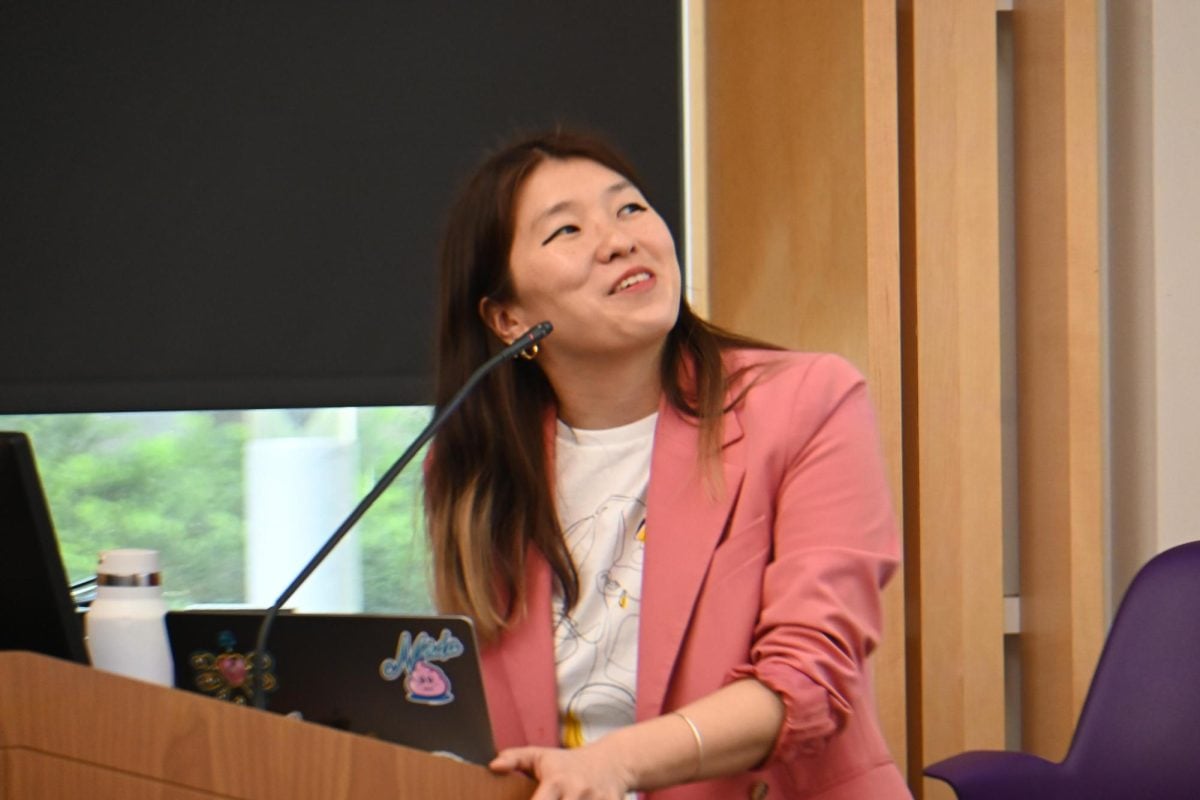Author Quan Zhou talked about her experience as a Spanish-speaking Qingtianese person in Spain at Kresge Hall on Thursday afternoon to around 30 students and faculty members.
The Department of Spanish and Portuguese invited Zhou to speak about diversity, identity and stereotypes within the Chinese diaspora. Her talk “Chinese Diaspora in Spain: Introducing Qingtianese Heritage” was filled with her cartoons and art.
Zhou is currently the chair in Spanish Culture and Civilization at New York University. She has written graphic novels about the immigrant experience including “Gazpacho agridulce: Una autobiografía chino-andaluza” and “Andaluchinas por el mundo.”
Spanish Prof. Elisa Baena teaches about Zhou in her classes, like in her section of Spanish 204: Advanced Spanish II: Artivism in Times of Political Change, a class that focuses on artists who use their work for activism.
“I read (Zhou’s) book and the drawings, and (her) sense of humor makes it so easy to understand what (she) is communicating,” Baena said. “It is very difficult to do that.”
Zhou said her family immigrated to Spain from the Qingtian area of China in the 1980s to escape the one-child policy and for greater economic opportunity. Zhou said many Qingtianese people immigrated to countries in Europe like Spain, the Netherlands, France and Italy to try and improve their lives.
While growing up in Spain, Zhou said her identity was challenged as she was bullied at school for being Chinese. She said her ethnic identity was “weaponized” against her outside the home but added that her mom would tell her she was Spanish too and that she only has “a Chinese face.”
“Whatever I tried, it wasn’t enough for the Spanish people to be considered fully Spanish. It wasn’t enough for my family to be considered fully Chinese,” Zhou said.
Zhou said her family was a part of the approximately 600 Chinese people that lived in Spain at the time.
Zhou also said that throughout Europe, many “Chinatowns” are being gentrified, causing Asian people to be displaced.
McCormick junior Cam Estrada said he found Zhou to be engaging and humorous in her talk. Estrada said he was not previously aware of Chinese people’s struggles when living in Europe.
“(The talk) familiarized me with the struggles of gentrification within the whole world that I was aware of, but not to that extent,” Estrada said.
Zhou said she has been told in England that her English has a Chinese accent. However, she said, Chinese people tell her she has a Spanish accent.
“Biases alter the perception of reality of what you think people are,” Zhou said. “Maybe you perceive what they are, or you think how they will behave, even though that might not be objectively true.”
Zhou said Spain imported many American stereotypes about Asians from American culture and cinema like the “model minority,” “lotus flower” and “dragon lady.”
The “model minority” stereotype is the myth that Asian people do not cause problems, Zhou said. She said the Spanish police found that Asian people are more likely to be robbed and attacked.
“Because of this stereotype, you are perceived as a weak victim,” Zhou said. “You’re gonna have a lot of cash on your body, and you’re not gonna do anything about it. You’re not gonna go to the police, so you are a target.”
Zhou said the stereotypes that Chinese women are submissive, don’t want romance and more were difficult growing up.
“I have the conclusion that the Western (world) created this homogeneous Western Chinese fantasy which is a Chinese blob,” Zhou said. “Everybody that is from East Asia, they put everyone in this box of homogeneous Chinese fantasy.”
Email: ninethkanieskikoso2027@u.northwestern.edu
Related Stories:
— Fourth annual Umbrella Arts Festival celebrates Asian diaspora cultures, art
— ‘Hunger Games’ actress Ashley Liao discusses Asian American representation in acting industry
— Chicago Latino Film Festival comes to NU to educate students of Latino culture



















